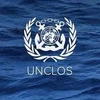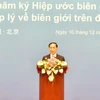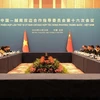The Ambassador of Vietnam to Indonesia Nguyen Xuan Thuy had his article “Another side of the dispute in the SCS” on the Jakarta Post published on May 25 to challenge the groundless claims by Liu Hongyang, chargé d’affaires at the Chinese Embassy in Indonesia, mentioned that the Xisha (or Paracel) Islands “are an inherent territory of China”.
Following here is the full text of the article written by Ambassador Nguyen Xuan Thuy:
In the piece “Vietnam’s dangerous acts”, Liu Hongyang, chargé d’affaires at the Chinese Embassy in Indonesia, mentioned that the Xisha (or Paracel) Islands “are an inherent territory of China”.The international community has recognised this since World War II, while former Vietnamese premier Pham Van Dong publicly recognised these and other islands as Chinese territory on Sept. 14, 1958.
I feel compelled to offer the following points to set the record straight.
In the first place, Vietnam has adequate historical evidence and legal grounds to assert its sovereignty over the Paracel (Hoang Sa in Vietnamese) and Spratly (Truong Sa in Vietnamese) islands.
It is clear from official historical records that Vietnam has peacefully and continuously exercised sovereignty over the Paracel and Spratly islands since at least the 17th century, when these territories were considered terra nullius.
A good example of the care that Vietnamese emperors took to consolidate their sovereignty over these territories was the building of a pagoda in 1835 and the placement of a stone monument on the Paracel Islands by Emperor Minh Mang.
China, for its part, expressed no intention of claiming sovereignty over the Paracel and Spratly islands. On the contrary, many maps describing Chinese territory under the Ch’ing dynasty depicted Hainan Island as the southern end of Chinese territory. One of these maps was recently presented by German Chancellor Angela Merkel to Chinese President Xi Jinping as a gift during Xi’s visit to Germany in March 2014.
When France established its protectorate over Vietnam in 1884, France took over the administration of the Paracel and Spratly islands on behalf of Vietnam .
In addition, Vietnam ’s sovereignty over the Paracel and Spratly islands was recognised by the San Francisco Peace Conference held in September 1951, which was attended by the leaders of 51 states, the purpose of which was to address the territorial issues in the aftermath of World War II.
At this conference, the head of the Vietnamese delegation, Tran Van Huu, then prime minister under the regime of King Bao Dai, asserted Vietnam’s sovereignty over the Paracel and Spratly islands in the absence of protest from the 50 other participating delegations.
It is also interesting to note that at the same San Francisco conference, the proposed amendment that would have made the San Francisco Peace Treaty provide for a recognition of China’s sovereignty over, inter alia, the Paracel and Spratly islands was rejected by 46 of the 51 participants.
In addition, the participants at the 1954 Geneva Conference on the restoration of peace in Indochina — China being among them — confirmed their recognition of and respect for Vietnam ’s independence and territorial integrity. As a participant in the conference, France complied with the San Francisco treaty and withdrew its forces from Vietnam in 1956. The Republic of Vietnam , following the withdrawal of France , resumed administration over these islands, undertook various acts and made several declarations to affirm its sovereignty over them.
There is no denying the fact that in 1974, China used force to occupy the Paracel Islands . This act of aggression violated a peremptory norm of international law (jus cogens), prohibiting the use of force in international relations as provided in Article 2(4) of the UN Charter.
Stemming from a grave breach of jus cogens, the current occupation of the Paracel Islands by China does not establish a valid title for China , regardless of how long the Chinese have been there and what measures they have employed to enforce their administration.
China itself endorsed this principle in an aide memoire of May 12, 1988, by China’s Foreign Affairs Ministry, which stated that aggression would never establish sovereignty. From a legal and historical perspective, China ’s claim over the Paracel Islands is groundless. Liu’s insistence that the Paracel Islands belong to China is, therefore, a false argument.
Second, Liu was intentionally wrong in citing the letter dated Sept. 14, 1958, by then prime minister Dong, as public recognition of China ’s sovereignty over, inter alia, the Paracel Islands .
In his letter, the prime minister did not mention one word about China’s territories, still less the Paracel and Spratly islands. He only noted and supported China ’s claim of its 12-nautical-mile territorial sea. In addition, the fact that he did not mention these islands was appropriate in the historical context: These islands had been under the administration of the Republic of Vietnam since 1956, as referred to above.
China , as a participant at the Geneva Conference, was surely aware of the fact that the geographical scope of administration of Vietnam divided at the line of the 17th parallel, as stated in the 1954 Geneva agreement on Vietnam .
Moreover, China’s statements that there is no dispute over the Paracel Islands are contrary to what has been acknowledged by China’s leaders. For example, in September 1975, the then deputy prime minister, Deng Xiaoping, told the then first secretary-general of the Vietnam Workers’ Party, Le Duan, that the two sides (Vietnam and China) had different opinions about the Paracel and Spratly islands, which would be resolved through negotiations. This statement was recorded in the Chinese Foreign Affairs Ministry’s aide memoire dated May 12, 1988.
However, there is one point on which Liu is right, when he said, “We should not listen to only one side of the story.” I take this as an invitation to offer readers my side of the story.-VNA
Following here is the full text of the article written by Ambassador Nguyen Xuan Thuy:
In the piece “Vietnam’s dangerous acts”, Liu Hongyang, chargé d’affaires at the Chinese Embassy in Indonesia, mentioned that the Xisha (or Paracel) Islands “are an inherent territory of China”.The international community has recognised this since World War II, while former Vietnamese premier Pham Van Dong publicly recognised these and other islands as Chinese territory on Sept. 14, 1958.
I feel compelled to offer the following points to set the record straight.
In the first place, Vietnam has adequate historical evidence and legal grounds to assert its sovereignty over the Paracel (Hoang Sa in Vietnamese) and Spratly (Truong Sa in Vietnamese) islands.
It is clear from official historical records that Vietnam has peacefully and continuously exercised sovereignty over the Paracel and Spratly islands since at least the 17th century, when these territories were considered terra nullius.
A good example of the care that Vietnamese emperors took to consolidate their sovereignty over these territories was the building of a pagoda in 1835 and the placement of a stone monument on the Paracel Islands by Emperor Minh Mang.
China, for its part, expressed no intention of claiming sovereignty over the Paracel and Spratly islands. On the contrary, many maps describing Chinese territory under the Ch’ing dynasty depicted Hainan Island as the southern end of Chinese territory. One of these maps was recently presented by German Chancellor Angela Merkel to Chinese President Xi Jinping as a gift during Xi’s visit to Germany in March 2014.
When France established its protectorate over Vietnam in 1884, France took over the administration of the Paracel and Spratly islands on behalf of Vietnam .
In addition, Vietnam ’s sovereignty over the Paracel and Spratly islands was recognised by the San Francisco Peace Conference held in September 1951, which was attended by the leaders of 51 states, the purpose of which was to address the territorial issues in the aftermath of World War II.
At this conference, the head of the Vietnamese delegation, Tran Van Huu, then prime minister under the regime of King Bao Dai, asserted Vietnam’s sovereignty over the Paracel and Spratly islands in the absence of protest from the 50 other participating delegations.
It is also interesting to note that at the same San Francisco conference, the proposed amendment that would have made the San Francisco Peace Treaty provide for a recognition of China’s sovereignty over, inter alia, the Paracel and Spratly islands was rejected by 46 of the 51 participants.
In addition, the participants at the 1954 Geneva Conference on the restoration of peace in Indochina — China being among them — confirmed their recognition of and respect for Vietnam ’s independence and territorial integrity. As a participant in the conference, France complied with the San Francisco treaty and withdrew its forces from Vietnam in 1956. The Republic of Vietnam , following the withdrawal of France , resumed administration over these islands, undertook various acts and made several declarations to affirm its sovereignty over them.
There is no denying the fact that in 1974, China used force to occupy the Paracel Islands . This act of aggression violated a peremptory norm of international law (jus cogens), prohibiting the use of force in international relations as provided in Article 2(4) of the UN Charter.
Stemming from a grave breach of jus cogens, the current occupation of the Paracel Islands by China does not establish a valid title for China , regardless of how long the Chinese have been there and what measures they have employed to enforce their administration.
China itself endorsed this principle in an aide memoire of May 12, 1988, by China’s Foreign Affairs Ministry, which stated that aggression would never establish sovereignty. From a legal and historical perspective, China ’s claim over the Paracel Islands is groundless. Liu’s insistence that the Paracel Islands belong to China is, therefore, a false argument.
Second, Liu was intentionally wrong in citing the letter dated Sept. 14, 1958, by then prime minister Dong, as public recognition of China ’s sovereignty over, inter alia, the Paracel Islands .
In his letter, the prime minister did not mention one word about China’s territories, still less the Paracel and Spratly islands. He only noted and supported China ’s claim of its 12-nautical-mile territorial sea. In addition, the fact that he did not mention these islands was appropriate in the historical context: These islands had been under the administration of the Republic of Vietnam since 1956, as referred to above.
China , as a participant at the Geneva Conference, was surely aware of the fact that the geographical scope of administration of Vietnam divided at the line of the 17th parallel, as stated in the 1954 Geneva agreement on Vietnam .
Moreover, China’s statements that there is no dispute over the Paracel Islands are contrary to what has been acknowledged by China’s leaders. For example, in September 1975, the then deputy prime minister, Deng Xiaoping, told the then first secretary-general of the Vietnam Workers’ Party, Le Duan, that the two sides (Vietnam and China) had different opinions about the Paracel and Spratly islands, which would be resolved through negotiations. This statement was recorded in the Chinese Foreign Affairs Ministry’s aide memoire dated May 12, 1988.
However, there is one point on which Liu is right, when he said, “We should not listen to only one side of the story.” I take this as an invitation to offer readers my side of the story.-VNA



















